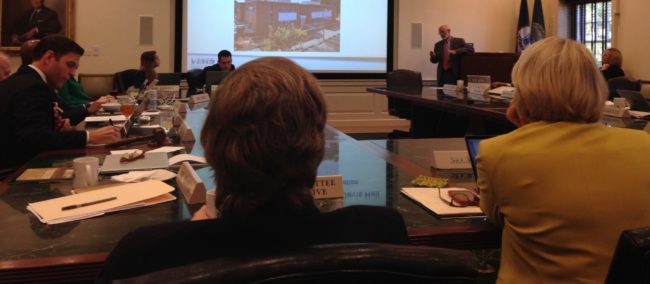Thursday, Nov. 16, the Committee on Administration, Buildings and Grounds of the College of William and Mary’s Board of Visitors met to discuss nine resolutions. While seven of these were approved, two were deferred, for the Board to discuss at their February session. These deferred resolutions deal with regulations of weapons and open flames on campus and will be discussed during the Feb. 7-9 session of the BOV.
According to Committee Chair Will Payne ’01, the Board decided to defer these two resolutions in order to do more research on the best way to go about promoting safety on campus.
After speaking with [Rector Todd Stottlemyer ’85] and [College President Taylor Reveley], we have asked the administration and university counsel to conduct a thorough review of these two draft regulations and any other policies and regulations that pertain to the safety for all those who come on to our campus,” Payne said.
“After speaking with [Rector Todd Stottlemyer ’85] and [College President Taylor Reveley], we have asked the administration and university counsel to conduct a thorough review of these two draft regulations and any other policies and regulations that pertain to the safety for all those who come on to our campus,” Payne said. “As part of this review, we have asked university counsel to further consult with law enforcement, the Attorney General’s office and representatives of Virginia’s other universities on changes they may be contemplating to their current policies.”
In 2011, the BOV first adopted a policy prohibiting weapons in campus buildings and at College events. According to the text of Resolution 12, the aim with the amendments is to expand the prohibition of weapons to inside all College buildings and at outdoor locations and events controlled by the College.
The amended policy not only bans weapons from all property under the control of the College as the current policy does, but also says that weapons are prohibited “while attending an athletic, academic, social, recreational or educational event, or on vehicles or vessels that are university property.”
The largest difference between the two policies comes in the consequences for being found to have a prohibited weapon. In the current policy, someone caught with a weapon on College property “will be asked to remove it immediately” and will face “disciplinary action.” The amended policy also says those in violation will be subject to disciplinary action, but adds that they will be “subject to arrest.”
Resolution 13 deals with the regulations surrounding open flames on campus. Currently, the existing policy is that individuals must have a permit before igniting an open flame on College property, but no codified regulations exist. The proposed resolution would codify the policy that individuals must have a permit to light an open flame on property controlled by the College, including inside College buildings.
Exceptions to this policy would include academic coursework under faculty supervision, lighting a cigarette in authorized locations and small celebration candles lit for a brief period and then blown out. Outside of these exceptions, individuals would have to apply for a permit through the Office of Environmental Health and Safety.
Just like with the weapons policy, failure to comply with the open flames policy could leave an individual subject to College disciplinary action and arrest.
The BOV will review these policy proposals again in February to determine if they should be implemented.
We expect [Reveley] and the administration to come back to the Board in February with any recommendations for changes to existing regulations and polices that they believe would enhance the safety of all those who come on to our campus,” Payne said.
“We expect [Reveley] and the administration to come back to the Board in February with any recommendations for changes to existing regulations and polices that they believe would enhance the safety of all those who come on to our campus,” Payne said. “The Board intends to review any recommended changes at that time and, if action is warranted, will recommend amendments to any current regulations and decide next steps.”

